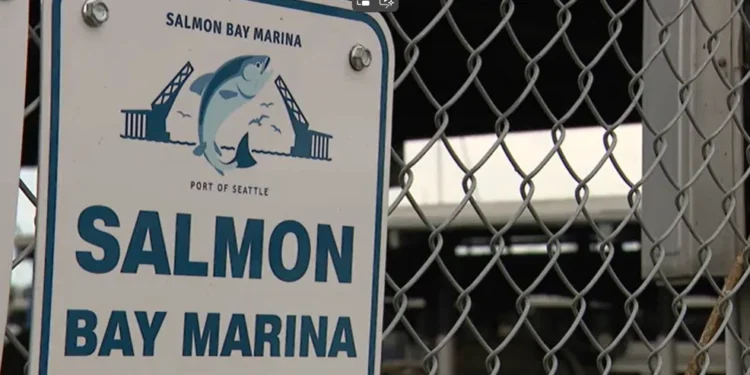The Port of Seattle will permanently close three docks at Salmon Bay Marina in Interbay by March 2026, displacing approximately 150 boat slips including 10 liveaboard residents due to deteriorating infrastructure deemed unsafe for repair.
The Port confirmed it will close Docks A, B, and C at the 1961-built marina after engineering reviews revealed escalating safety issues including aging roof structures, fungal damage, and mechanical deterioration of underwater pilings. Notices posted to dock gates in mid-September informed customers of the decision.
Overnight stays for liveaboard residents will be prohibited on the three docks after November 18, with complete closure to all users by March 18, 2026. The two uncovered docks will remain operational.
John Chaney, who has lived on one of the affected docks for nearly five years, faces the challenge of relocating his houseboat in a tight marina market with limited availability and high costs. “I was surprised because they just told us we were evicted, essentially,” Chaney said.
Port of Seattle Executive Director Stephen Metruck addressed the closure at a September 23 commission meeting, citing engineering findings about structural deficiencies. “The safety of our customers and our staff is our priority, and this is a needed step to avoid additional risks due to high winds, snow, and freezing rain due to safety concerns with the structures,” Metruck stated.
External engineering studies concluded the moorage docks “exhibit significant configuration and condition issues beyond reasonable repair” and “can no longer be maintained to an acceptable level of safety and must be vacated.”
Boaters questioned why the Port didn’t address deteriorating conditions sooner despite regular rate increases. “The port has been increasing the moorage here since they purchased it, upwards of 10% a year,” Chaney explained. “What we’ve not seen is that money reinvested in the marina, and that saddens us because I don’t mind paying a higher moorage rate if the return for that is that I get a safe place for my boat and for me to live.”
Scott Cates, who has friends at the marina, echoed concerns about maintenance deferrals. “The floats that hold things up in the water are in disrepair, so my question is, ‘Why haven’t they done that?'”
Port officials stated they reached 30% design completion for dock replacement but determined that rebuilding would require years of design work, permitting, compliance with fish windows, and overwater construction challenges that would leave liveaboard residents without housing indefinitely.
There are no current plans to repair, reopen, or sell the affected docks. Port officials offered displaced customers several resources including immediate slip availability at Shilshole Marina for liveaboard residents, towing reimbursements for floating residences, financial support for severe weather lodging, and dedicated moorage coordinator assistance.
“We understand that this will be challenging for affected customers, especially those who live aboard,” a Port spokesperson said, emphasizing that safety concerns could not wait for lengthy reconstruction timelines.
Chaney expressed hope that port commissioners might reconsider and allow future return rights for displaced tenants once infrastructure issues are addressed.







